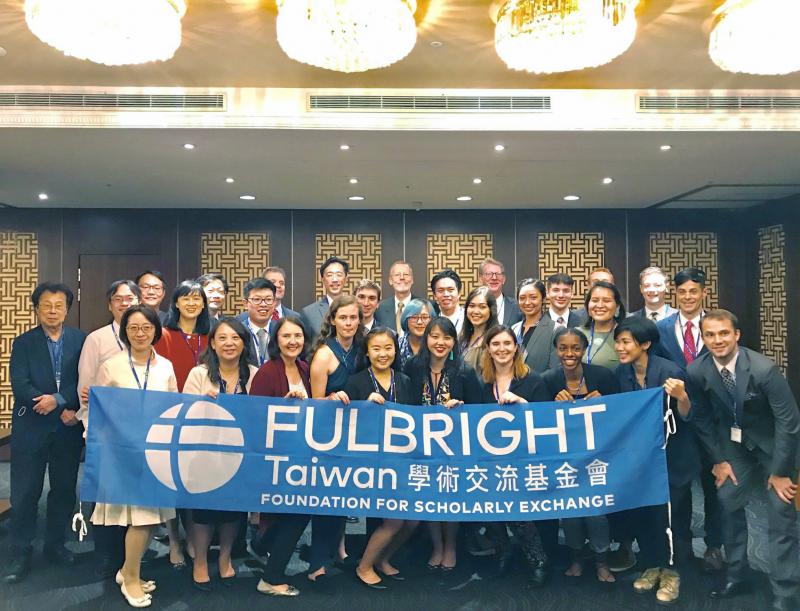The government aims to make Taiwan the top destination for Mandarin learners from the US, Deputy Minister of Foreign Affairs Harry Tseng (曾厚仁) said yesterday.
Tseng made the remarks at a two-day symposium, called Teaching Chinese as a Second Language in the US, which opened in Taipei yesterday, and was attended by officials and Chinese-language teaching experts.
The US-Taiwan Education Initiative, launched on Dec. 3, 2020, is to expand access to Mandarin learning to students in the US, while safeguarding academic freedom, American Institute in Taiwan (AIT) Deputy Director Jeremy Cornforth said.

Photo courtesy of American Institute in Taiwan
Cornforth thanked the Ministry of Education, the Ministry of Foreign Affairs and the Foundation for Scholarly Exchange (Fulbright Taiwan) for helping more than 200 American Fulbrighters travel to Taiwan last year, despite COVID-19-related restrictions.
Taiwan is the biggest partner of the US’ Fulbright program, Tseng said.
“Some countries” have utilized language teaching as a tool to infiltrate and undermine democratic societies, he said, without elaborating.
To counteract such infiltration, Taiwan must stand out to share its quality Chinese-language teachers and teaching resources — a better “Taiwan model” — with its like-minded democratic partners, he said.
“Taiwan is the most reliable partner for the US,” as both sides would work more closely to promote Taiwan’s teaching methods, Tseng said.
Hopefully, Taiwan would become the top destination for Mandarin learners arriving from the US, he said.
Taiwanese who teach the Chinese language in other countries are not only teachers, but must also shoulder the responsibility of spreading Taiwanese culture and values, National Security Council Deputy Secretary-General Hsu Szu-chien (徐斯儉) said.
The government is working with the US and European countries to promote Taiwan’s model of teaching the Chinese language, he said.
Ten Taiwanese schools have since last year worked with more than 20 US schools to promote Chinese-language learning, Deputy Minister of Education Lio Mon-chi (劉孟奇) said.
The education ministry offers US students scholarships to study Chinese in Taiwan, and it would increase subsidies for Chinese-language teachers working in the US, he said.
The education ministry is also helping local schools that partner with schools in Australia, New Zealand and the UK, Lio said.

NATIONAL SECURITY THREAT: An official said that Guan Guan’s comments had gone beyond the threshold of free speech, as she advocated for the destruction of the ROC China-born media influencer Guan Guan’s (關關) residency permit has been revoked for repeatedly posting pro-China content that threatens national security, the National Immigration Agency said yesterday. Guan Guan has said many controversial things in her videos posted to Douyin (抖音), including “the red flag will soon be painted all over Taiwan” and “Taiwan is an inseparable part of China,” while expressing hope for expedited “reunification.” The agency received multiple reports alleging that Guan Guan had advocated for armed reunification last year. After investigating, the agency last month issued a notice requiring her to appear and account for her actions. Guan Guan appeared as required,

A strong cold air mass is expected to arrive tonight, bringing a change in weather and a drop in temperature, the Central Weather Administration (CWA) said. The coldest time would be early on Thursday morning, with temperatures in some areas dipping as low as 8°C, it said. Daytime highs yesterday were 22°C to 24°C in northern and eastern Taiwan, and about 25°C to 28°C in the central and southern regions, it said. However, nighttime lows would dip to about 15°C to 16°C in central and northern Taiwan as well as the northeast, and 17°C to 19°C elsewhere, it said. Tropical Storm Nokaen, currently

‘NATO-PLUS’: ‘Our strategic partners in the Indo-Pacific are facing increasing aggression by the Chinese Communist Party,’ US Representative Rob Wittman said The US House of Representatives on Monday released its version of the Consolidated Appropriations Act, which includes US$1.15 billion to support security cooperation with Taiwan. The omnibus act, covering US$1.2 trillion of spending, allocates US$1 billion for the Taiwan Security Cooperation Initiative, as well as US$150 million for the replacement of defense articles and reimbursement of defense services provided to Taiwan. The fund allocations were based on the US National Defense Authorization Act for fiscal 2026 that was passed by the US Congress last month and authorized up to US$1 billion to the US Defense Security Cooperation Agency in support of the

PAPERS, PLEASE: The gang exploited the high value of the passports, selling them at inflated prices to Chinese buyers, who would treat them as ‘invisibility cloaks’ The Yilan District Court has handed four members of a syndicate prison terms ranging from one year and two months to two years and two months for their involvement in a scheme to purchase Taiwanese passports and resell them abroad at a massive markup. A Chinese human smuggling syndicate purchased Taiwanese passports through local criminal networks, exploiting the passports’ visa-free travel privileges to turn a profit of more than 20 times the original price, the court said. Such criminal organizations enable people to impersonate Taiwanese when entering and exiting Taiwan and other countries, undermining social order and the credibility of the nation’s